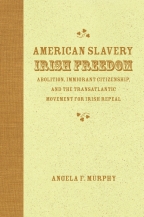
304 pages / 6.00 x 9.00 inches / no illustrations
History / American History | Social Studies / Slavery Studies
Irish Americans who supported the movement for the repeal of the act of parliamentary union between Ireland and Great Britain during the early 1840s encountered controversy over the issue of American slavery. Encouraged by abolitionists on both sides of the Atlantic, repeal leader Daniel O'Connell often spoke against slavery, issuing appeals for Irish Americans to join the antislavery cause. With each speech, American repeal associations debated the proper response to such sentiments and often chose not to support abolition. In American Slavery, Irish Freedom, Angela F. Murphy examines the interactions among abolitionists, Irish nationalists, and American citizens as the issues of slavery and abolition complicated the first transatlantic movement for Irish independence.
The call of Old World loyalties, perceived duties of American citizenship, and regional devotions collided for these Irish Americans as the slavery issue intertwined with their efforts on behalf of their homeland. By looking at the makeup and rhetoric of the American repeal associations, the pressures on Irish Americans applied by both abolitionists and American nativists, and the domestic and transatlantic political situation that helped to define the repealers' response to antislavery appeals, Murphy investigates and explains why many Irish Americans did not support abolitionism. Murphy refutes theories that Irish immigrants rejected the abolition movement primarily for reasons of religion, political affiliation, ethnicity, or the desire to assert a white racial identity. Instead, she suggests, their position emerged from Irish Americans' intention to assert their loyalty toward their new republic during what was for them a very uncertain time.
The first book-length study of the Irish repeal movement in the United States, American Slavery, Irish Freedom conveys the dilemmas that Irish Americans grappled with as they negotiated their identity and adapted to the duties of citizenship within a slaveholding republic, shedding new light on the societal pressures they faced as the values of that new republic underwent tremendous change.
“Factual, clearly written, and well organized . . . . An important contribution to bringing the transatlantic repeal movement into the mainstream of antebellum American—and southern—history.”—Journal of Southern History
“Murphy’s study makes an innovative and distinguished contribution to a lively field. . . . should be consulted by anyone seeking a clear pathway through a fraught historical landscape.”—Journal of American History
“American Slavery, Irish Freedom should inspire historians to think more seriously about the reality of an antislavery and anti-Catholic dialectic woven into America’s nationalistic mindset.”—Journal of the Early Republic
“This book is a welcome intervention into studies of mid-nineteenth-century Irish American transatlantic politics.”—American Historical Review
“[A] well-written and highly informative work. . . . Murphy is to be commended for the thoroughness of her research.”—American Studies
“Well written and impressively researched, this work should be of significant value to scholars of nineteenth-century transatlantic social movements, as well as to those interested in racial formation in the United States.”—H-CivWar
“Murphy’s work offers a corrective on those who explain nineteenth-century Irish American attitudes toward slavery in purely racial terms. . . . [Her book,] beautifully written, will offer much to scholars and students of abolition and slavery, Irish and black nationalism, and the complicated and convoluted creation of ethnic and national identities.”—Journal of American Ethnic History
Found an Error? Tell us about it.